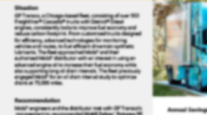ATA Willing to Back New Options to Solve Highway Funding Crisis
This story appears in the May 26 print edition of Transport Topics.
American Trucking Associations said it would support such measures as a tax on crude oil, a national highway fee on cars and trucks and repatriation of corporate profits held overseas to pay for highways, given the transportation funding crisis and Congress’ refusal to raise fuel taxes.
“While we continue to believe that the fuel tax is the fairest, most efficient method of funding our highway system, we also recognize the political difficulties of getting an increase through Congress,” ATA President Bill Graves said.
ATA announced its support for measures other than a fuel tax increase May 21 at the federation’s annual leadership meeting in Scottsdale, Arizona.
The menu of options for generating more money for roads came from a funding task force that ATA formed in March.
“The work of this task force lays out what is acceptable to the trucking industry, and what should be acceptable to our political leaders to address the Highway Trust Fund crisis,” Graves added.
The fund is expected to be empty by August and the current transport-funding law expires Sept. 30.
ATA’s decision to support new options “reaffirms our commitment to a strong, well-funded federal highway program,” said ATA Chairman Philip Byrd Sr., president of Bulldog Hiway Express in South Carolina.
The other revenue-raising methods ATA said it would support are:
• Indexing the fuel tax to inflation or to the mandatory federal fuel standards that diminish revenue as vehicles become more fuel efficient.
• Use the revenue from indexing to subsidize bonds for road projects.
• Direct royalties from new oil and gas leases to the trust fund.
• Use general funds as a last resort to keep the fund solvent.
Congress has been making annual transfers from the general fund recently, this year for $10 billion.
The Senate is considering a new bill that would maintain existing spending plus inflation for six years, but to to do so Congress must find $100 billion beyond what fuel taxes would generate.
ATA did not specify amounts for new taxes on crude oil or for what it called a “highway access” fee.
“It’s basically just a registration fee on all vehicles,” said Darrin Roth, ATA director of highway operations. It would be collected by the states and sent to the trust fund, he said.
The task force also did not specify how to repatriate overseas corporate profits for infrastructure investment. President Obama and some lawmakers have advanced plans to lure back profits that corporations keep overseas to avoid taxes.
Justin Harclerode, spokesman for the House Transportation and Infrastructure Committee’s GOP majority, said: “The committee appreciates input and ideas from all interested parties as Congress works to develop the next surface transportation bill.”
Rep. Peter DeFazio (D-Ore.) welcomed ATA’s options, three of which he’s already proposed — the barrel tax on crude, indexing and using that revenue for bonding.
“We have a real cliff on a real issue that will affect the real economy,” DeFazio said.
Other reactions were mixed.
“I think any time people are talking about the Highway Trust Fund and the trouble that it’s in helps to raise the profile of the problem,” said Jim Tymon, a director of the American Association of State Highway and Transportation Officials.
ATA’s options show the nation’s frustration with a Congress that lacks the courage to address the transportation funding crisis, said former Pennsylvania Gov. Edward Rendell, co-chairman of Building America’s Future, which advocates greater infrastructure investment.
“It’s an interesting menu, some interesting ideas, but the bottom line is Congress has to man-up, have the courage to tell the people the truth, which is we’ve got to raise revenue and that means raising some form of taxes,” Rendell said.
Joshua Schank, president, Eno Center for Transportation, said ATA’s hand in the funding debate would be stronger if it tied its suggestions to specific transport needs.
“As usual ATA is much more focused on how do we fund this rather than how do we spend this more effectively,” Schank said.
Rather than making suggestions for filling the trust fund that allocates money to the states under old formulas, ATA should tie its revenue idea to specific needs, such as clearing freight bottlenecks, Schank said.
Both Schank and Patrick Sabol, a senior researcher at the Brookings Institution, said ATA’s funding options are not new ideas.
They were also skeptical about Congress approving new taxes. They aren’t in the cards, Sabol said.
“Not to be pessimistic, but I think it’s going to be general fund transfers,” Sabol said.




